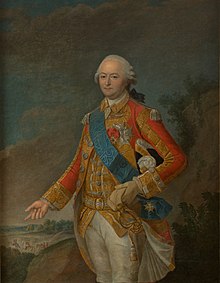Emmanuel-Armand de Vignerot du Plessis de Richelieu, duc d'Aiguillon
Emmanuel Armand de Vignerot du Plessis, Duke of Aiguillon (born July 31, 1720 - † September 1, 1788 in Paris ), Prince of Portien , Count of Saint-Florentin , Duke of Aiguillon (since 1750), Count (since 1750, later Duke) of Agenois and Peer of France , was a French military and foreign and war minister under Louis XV.
Life
Aiguillon was born the son of Armand Louis de Vignerot du Plessis (1683-1750) and Anne Charlotte de Crussol de Florensac (1700-1772). He was a nephew of Marshal Richelieu . At seventeen he joined the army and at nineteen he was appointed Colonel des Régiment de Brie . He served in the campaigns in Italy during the War of the Austrian Succession , was seriously wounded in the Battle of Pierrelongue near Chateau-Dauphin in 1744 , captured in 1746 and promoted to Maréchal de camp in 1748 .
His marriage in 1740 to Louise Félicité de Bréhan, daughter of the comte de Plélo , together with his connection to the Richelieu family, gave him an important position at the court. He was a member of the so-called parti dévot , the parliamentary group against Madame de Pompadour , the Jansenists and parliament.
From 1753 to 1768 he served as the commandant of Brittany . He wasn't popular there. The province had retained a large number of privileges (called "freedoms"). In 1758 he won the Battle of Saint-Cast against English troops. In the same year he came into conflict with the provincial estates because of the taxes to the king.
In 1762 he brought the Parliament of Brittany (1554-1790) against him because he disregarded the privileges of the province. In June 1764 the king overturned a parliamentary decree prohibiting the collection of new taxes without the consent of the estates; he refused to receive the parliamentary protests against the duke. On November 11, 1765, the procurator of Parliament, Louis-René de Caradeuc de La Chalotais was arrested. It is uncertain whether this was done at the instigation of Aiguillon. The conflict between Aiguillon and the Bretons lasted two years. Instead of parliament, which had dissolved, Aiguillon organized a tribunal with more or less competent judges who were mocked and ironically called bailliage d'Aiguillon by the pamphlet writers .
In 1768 the duke was forced to abolish the tribunal and returned to the court at Versailles. On December 24, 1770 he achieved the dismissal of the Minister Étienne-François de Choiseul . When Louis XV. on the advice of Madame Dubarry reformed the government with a view to suppressing the resistance of the parliaments, Aiguillon was appointed Foreign Minister (1771–1774).
Also Maupeou and the Abbé Terray (1715-1778) received items in the cabinet. It was very unpopular and was called the triumvirate . All government failures have been blamed on the mistakes of the ministers. In 1772 Aiguillon was accused of the coup d'état of Gustav III. to have provoked by Sweden ; in fact the instructions to the Comte de Vergennes , the French ambassador to Sweden, had been written by the Duke de la Vrilliere . Aiguillon agreed to the first partition of Poland . Although he was a supporter of the Jesuits , he consented to the repeal of the Jesuit order. From January 1774 to June 1774 he served as Minister of Defense.
After the death of Louis XV. he quarreled with Maupeou and the young Queen Marie Antoinette , who in 1774 demanded his dismissal from the cabinet. Under King Louis XVI. ended his career. He lived at his castle in Véretz from May 16, 1775 and died in 1788.
In 1731 he was made an honorary member of the Académie royale des sciences .
See also Vignerot House
medal
- Knight of the Order of the Holy Spirit
Secondary literature
- Lucien Laugier, Le duc d'Aiguillon. , Albatros, Paris 1984
- Alain Paraillous, Le duc d'Aiguillon (1720–1788). , Editions Sud Ouest, Bordeaux 2010, ISBN 978-2-8177-0005-2
Web links
- Source on the La Chalotais Affair (George Mason University Fairfax, VA - USA)
- Letter from the Parliament of Brittany (George Mason University Fairfax, VA - USA)
Individual evidence
- ^ List of members since 1666: Letter R. Académie des sciences, accessed on February 21, 2020 (French).
| personal data | |
|---|---|
| SURNAME | Aiguillon, Emmanuel-Armand de Vignerot du Plessis de Richelieu, duc d ' |
| ALTERNATIVE NAMES | Vignerot du Plessis de Richelieu, Emmanuel Armand de |
| BRIEF DESCRIPTION | French statesman, Duke of Agenois and of Aiguillon |
| DATE OF BIRTH | July 31, 1720 |
| DATE OF DEATH | September 1, 1788 |
| Place of death | Paris |

